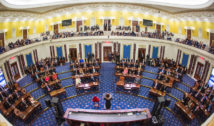
The Surprising Thing You Shouldn’t Mention on Your Resume
- By Kyle Glatz --
- 26 Jun 2014 --

photo: flazingo.com
Which religions are good to have on your resume? Which ones hurt your odds of being hired?
These are the questions a university study has attempted to answer.
Discriminatory hiring practices are nothing new in the United States workforce. There have always been individuals who have marginalized others based upon their race, religion, or sex. Recently there have been some studies which examined the nature of modern religious discrimination in the workplace and hiring process. One of the most prominent experiments was conducted by the University of Connecticut and involved altering a resume to include a religious affiliation, or lack of a religion, and submitting them to open positions. Here we will explore the findings of this particular experiment as well as other research which shows that there is a significant bias against those who willingly identify their religious affiliation.
University Of Connecticut Study
The University of Connecticut sent out six thousand applications to various businesses, using no religious affiliation as the control set. The experimental applications and resume used several religions including Islam, Catholicism, Evangelicalism, Judaism, and a fake religion they called Wallonian. Also included was Atheism, the lack of a religion. The results were rather astounding as they showed that there was a continual preference for those who did not associate themselves with any religion to those who identified with a religion.
However, the most surprising conclusion was that the applicants who identified as Muslims received one third of the callbacks compared to all of the other religions. The second and third least likely to receive a call were the applicants who identified as Atheist and Pagan. The only religion that appeared to receive any preferential treatment was Judaism, which received far more callbacks and email communications than any of the other religions. The overall findings of this study suggested that an individual had a much higher chance of being contacted for an interview if they did not include their religion on their resume.

Explaining The Disparity
The university study concluded that this was a result of an increase in secularization and a sense of social schizophrenia in terms of the feelings towards religions. In essence, individuals who openly identify a religion on their resume as being a large part of their life are discriminated against. This runs contrary to the belief that people throughout the United States are more accepting of religions to which they do not subscribe. While it is easy to say that we live in a nation of hypocrites, the results of the study seem to indicate that stereotypes of extremism may be partially to blame for the rejection of major religions and even Atheism. It has also been conjectured that similar stereotypes regarding high levels of education and business savvy is responsible for the acceptance of Jewish workers in certain contexts.
Another aspect of this hiring disparity is that the perceived relationship between religion and political affiliation has given some businesses a contrived justification for rejections. Some businesses may fear that the individual will not acclimate to their specific corporate culture if their religion, or lack thereof, conflicts with their political beliefs. Overall, it appears that religion is more consistently viewed as a drawback for workers, one that unfairly affects their ability to procure a job and is better left off of a resume.


















